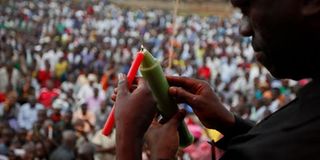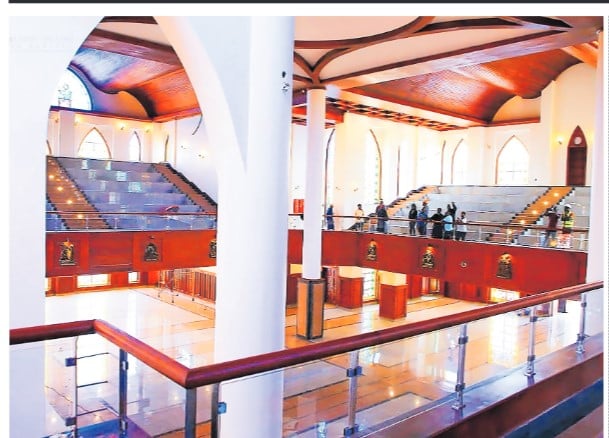Prime
Walk-to-Work: Uganda’s year of protest

Opposition leader Dr Besigye lights a candle at a memorial rally for walk-to-work victims last year. photo by Edward Echwalu
What you need to know:
There are many who have always rubbished the opposition-led protest but the Afrobarometer survey results show they have not been marching in vain.
So, last week the regional public opinion monitoring firm Afrobarometer published a report on what many of us know too well: three-quarters of Uganda’s population, male and female, east, west, north and central, urban and rural, believe that Uganda is in a crisis and is headed toward disaster.
The survey, conducted between December 2011 and February 2012, is the first national poll to sample the mood among Ugandans since the February 11, 2011 general election.
Many of us who spend our time complaining about the government now feel vindicated. So we are not alone. So it is not just we who are “disgruntled”. So when we write in newspapers, lament on radio and on Facebook and Twitter; we are not alone but are echoing what many now feel. So it is not, after all, a futile thing to be a commentator on public affairs.
It is coming to one year since the opposition, led by the Forum for Democratic Change and the Democratic Party, embarked on the “walk-to-work” protest campaigns. Knowing how lacklustre Ugandans tend to be, even most opposition supporters did not give it much chance to last more than a few days, perhaps three.
In its first phase, it lasted six weeks, the longest sustained non-military opposition protest action in Uganda’s entire history, including the years before independence. It was then in a state of slumber and resumed in October 2011, then faded off, only to resume in February, fade off and result in full force around the time of President Museveni’s swearing-in.
In total, the walk-to-work campaign has lasted one year in the public’s mind, an unprecedented success for any Ugandan opposition party or organisation.
Those who will record Ugandan history will note this as the first sign that Uganda’s opposition started, in 2011, to develop a certain staying power and focus. It is now starting to look a little like South Africa’s ANC, able to sustain protest marches across a period of time, more than a year, in the face of major police and military force and intelligence infiltration.
In fact, if we were to omit the uprisings in Tunisia and Egypt that succeeded by the people’s own voice and that in Libya that did the same with plenty of Nato support, the longest and most consistent non-“Arab Spring” protests in Africa of 2011 were those in Uganda.
Swaziland and Malawi attempted popular protests but these were quickly crushed. Cote d’ Ivoire needed decisive French intervention to break the deadlock between Laurent Gbagbo and Alassane Ouattara.
Uganda has sustained the longest of the Black African protest marches and opposition actions of the last 12 months.
For those who first thought Kizza Besigye, Olara Otunnu, Norbert Mao, Anne Mugisha, Wafula Oguttu, Mugisha Muntu, Nabilah Ssempala, Odonga Otto, Ken Lukyamuzi, Salaamu Musumba, Samuel Lubega, Nandala Mafabi, Beatrice Anywar, Ingrid Turunawe and many other opposition leaders were a group of pathetic losers, the Afrobarometer poll shows they did not march in vain.
They echoed what is now clearly a broad national sentiment. Many journalists, photographers, radio and TV reporters, at great risk to themselves and their equipment, covered these “walk-to-work” protests.
Passing of time
Behind the scenes, advocacy agencies like the Human Rights Network for Journalists, the HURINET, the Uganda Human Rights Commission and others abroad like the Committee for the Protection of Journalists worked to defend, seek medical treatment for and speak out for the many journalists who came under police and military gunfire, teargas, beatings and detention.
Long forgotten by most Ugandans and an increasing number of foreigners is the once-impeccable image of the NRM as the liberation force that, in late 1985, moved to consolidate its positions in a State then crumbling and in January 1986 seized power and, in the minds of many at that time, restored “sanity” to Uganda.
However, we need to examine something important here.
Why is it that Ugandans or at least some opposition protesters can walk-to-work and sustain other such public shows of protest, with 75 per cent of the population (as the Afrobarometer survey now shows) behind them at least in spirit, but somehow the government does not fall?
In Tunisia and Egypt, the protests lasted just over three weeks on average and the long-serving and much-feared leaders were gone from power.
History has shown that it is possible for the economy to sink and for 75 to 85 per cent of the population to be disgruntled, but for a regime to remain in place. This is mainly possible if the regime still has basic control of the military structures and the structures are disciplined or don’t mutiny.
In Uganda’s case, the NRM government from its earliest days managed, with great success, to achieve something rare: it put in the mind of most people the idea that trying to overthrow this government was not just an act of treason in the formal, legal sense of the term but more.
Even a fearless leader like Besigye, who no longer has to care about what he says, when asked the question, “Do you want to overthrow the government?” has to choose his words carefully. Even if Besigye were to declare that his main wish is to see the overthrow of the government, it is unlikely that storm troops would raid his home and arrest him over that utterance.
He has said worse things about the government. The NRM created in people’s sub-conscious mind that to publicly call for the overthrow of the regime was something almost sacrilegious, almost like having sex with one’s mother or even just entertaining the thought of having sex with one’s mother.
One gets the impression that even in the most secret FDC or A4C meeting, with no chance of any state informers or word leaking out, these opposition activists cannot get themselves to state the words “Our goal is to overthrow Museveni’s government”.
This, from what I have observed, is the main psychological barrier in Ugandans’ minds and those of the opposition. It partly explains why the activists can successfully sustain these series of protests of one year now, but they have remained indecisive.
The walk-to-work protests are like the full 90 minutes and extra time of a football match. But because the two sides cannot bring themselves to even utter the dreaded word “penalty shoot-out”, the referee adds them another 120 minutes of play that leads nowhere.
The crux of the matter
The fact that about 75 per cent of the population can express the view that the situation in Uganda is not only taking a turn for the worse but that there is little possibility that the future will get better, but there is no general uprising, leads to the third barrier: fear of the unknown.
A friend put it well last week: “Business is very low. People feel that there may be change any time… No one knows what happens next. Unfortunately, many people are gripped with fear, can’t demand, they can’t go to the streets, they are trying to protect the little they have.”
That is the crux of it. Most Ugandans, with so many family responsibilities to shoulder, with such a shortage of jobs, with business so slow and unprofitable, hang by a string in their daily lives. Even the thought of being sent to Luzira prison for three days is enough to completely disorganise their lives. Who would run the small shop, take foot to a patient in hospital, pay the village farm boy?
The risk of losing what little they have is much higher than the potential reward of taking the risk, taking part in protests, and in one mass public move, ousting the government. Everyone wishes someone would be courageous enough to do what the Egyptians and Tunisians did; someone else but not them.
So the year of protests now comes to an end. In terms of TV footage and newspaper images, it has been a major success for the opposition and public relations disaster for Museveni’s legacy.
In terms of speaking on behalf of the long-suffering population, Besigye who has had to endure physical harassment and bodily injury that would have broken almost every other man, has entered the pantheon of Ugandan history as one of the greatest heroes of all time. But in terms of dislodging or unsettling the real power centre in Uganda, nothing has taken place for one year.
That future must revolve around technical and managerial proficiency, not the political clamouring.




